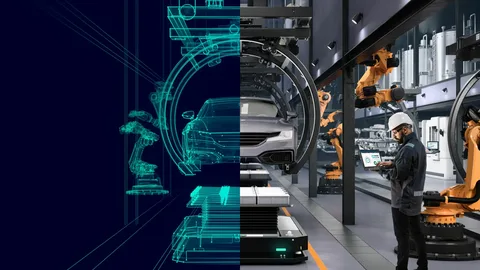As we move deeper into the digital decade, 2025 is shaping up to be a landmark year in technology. From quantum leaps in artificial intelligence to breakthroughs in energy, the world is on the brink of a transformation that will impact every aspect of human life. Whether you’re a business leader, tech enthusiast, or just someone trying to stay relevant, these powerful technologies of 2025 are not optional—they’re essential. Here’s a comprehensive look at the innovations you simply can’t afford to ignore.
Artificial Intelligence (AI) at Human Scale
AI is no longer a futuristic concept—it’s everywhere. But in 2025, AI will evolve from a supportive tool to a decision-making partner across industries. AI will power predictive healthcare, intelligent logistics, financial modeling, and personalized education. Chatbots will feel almost human, and AI will be trusted in mission-critical roles. If businesses don’t integrate AI into operations, they risk falling far behind. Meanwhile, new jobs in AI governance, training, and ethics will become central to the global workforce.
Generative AI and Content Creation
By 2025, generative AI—like GPT and DALL·E—will dominate content production. This technology will enable users to create entire videos, codebases, books, and music using just text prompts. For marketers, media companies, and educators, generative AI will mean faster production cycles, hyper-personalization, and reduced creative costs. However, it will also demand strict regulations to avoid misinformation, copyright issues, and deepfake misuse.
Quantum Computing Goes Mainstream
2025 will mark the point where quantum computing begins delivering real-world business solutions. These machines will solve problems in minutes that would take classical computers years, especially in cryptography, finance, weather modeling, and pharmaceuticals. IBM, Google, and emerging startups are pushing hard for commercial quantum-as-a-service platforms. For enterprises, ignoring quantum readiness could mean vulnerability to future security threats—and missed opportunities for innovation.
Biotechnology and AI-Driven Medicine
Health tech in 2025 will combine biotech, AI, and real-time diagnostics to offer precision treatments tailored to your DNA. Diseases will be detected through smart wearables before symptoms appear, and personalized therapies using gene editing (like CRISPR) will be more accessible. Startups in bioinformatics and AI-powered diagnostics will redefine how medicine is developed, delivered, and optimized. Healthcare will shift from reactive to predictive, extending not just lifespan—but healthspan.
6G Connectivity and Intelligent Networks
While 5G is still being rolled out globally, 6G development is already underway—and by 2025, initial deployments could begin in tech-forward regions. Promising speeds of up to 1000x faster than 5G, 6G will enable real-time holograms, tactile internet, and AI-managed smart cities. For consumers and businesses alike, this means near-instant communication, immersive virtual collaboration, and a leap toward fully autonomous systems. Ignoring 6G readiness would mean being unprepared for the next wave of digital infrastructure.
Decentralized Web (Web3) and Digital Ownership
The Web3 revolution will reach critical mass in 2025. Built on blockchain and decentralized protocols, it will allow users to own digital assets, control personal data, and interact through smart contracts. Whether it’s NFTs redefining art, DAOs managing communities, or DeFi disrupting banking, Web3 technologies will democratize the internet. Businesses will adopt token-based models and digital identity systems, while consumers will demand greater transparency and privacy.
Advanced Robotics and Automation
2025 will see robots operating well beyond factory floors. From autonomous delivery drones to AI-powered surgery assistants, advanced robotics will be used in logistics, agriculture, construction, and healthcare. These robots will not just follow commands—they’ll learn from their environment, adapt, and make independent decisions. For businesses, this means reduced labor costs and higher efficiency. For workers, reskilling for robot-assisted workplaces will become urgent.
Clean Energy and Climate Tech
In response to the climate crisis, 2025 will be a turning point for clean technology. From ultra-efficient solar panels and green hydrogen to AI-managed energy grids, innovation will make renewable energy not only cleaner—but cheaper. Companies that fail to adopt sustainable practices will face regulatory and consumer pressure. For entrepreneurs, climate tech will be the biggest investment opportunity of the decade. Expect job growth in environmental engineering, battery tech, and carbon offset analytics.
Extended Reality XR AR VR Mixed Reality
Immersive technologies will be everyday tools by 2025. Extended Reality (XR)—a combination of augmented, virtual, and mixed reality—will revolutionize training, education, retail, and collaboration. Remote work will happen in VR conference rooms; surgeons will practice on virtual patients. Businesses that embrace XR will engage users in more meaningful, interactive ways. Designers, developers, and storytellers fluent in XR tools will be in high demand across industries.
Brain-Computer Interfaces (BCIs) and Human Augmentation
Perhaps the most revolutionary of all, brain-computer interfaces will begin early-stage adoption in 2025. Companies like Neuralink and Synchron are developing devices that let the human brain interact directly with digital systems. This could restore mobility for disabled individuals, enable telepathy-like communication, and supercharge human learning. Though still controversial and experimental, BCIs represent the ultimate fusion of biology and technology—something you can’t afford to ignore in the long term.
Conclusion
By 2025, we won’t just see evolution—we’ll witness a technological inflection point that divides the past from the future. These ten technologies will not only revolutionize business models and professions but also how we think, communicate, heal, and live. Ignoring them is no longer an option; engaging with them is essential.
For businesses, this means investing in R&D, digital infrastructure, and talent. For individuals, it means staying curious, upskilling continuously, and embracing change. Governments and institutions must ensure that these breakthroughs are inclusive, ethical, and sustainable.

Leave a Reply